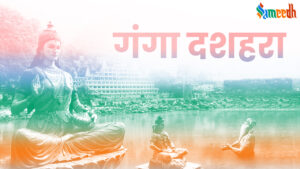Ganga Dussehra, also known as Gangavataran, is a Hindu festival celebrated in honor of the descent of the Ganges River to Earth. It usually falls on the tenth day (Dussehra) of the waxing moon (Shukla Paksha) in the Hindu month of Jyeshtha, which typically corresponds to May or June in the Gregorian calendar.

Ganga Dussehra is a Hindu festival celebrated to commemorate the descent of the sacred river Ganges (Ganga) to Earth. It holds significant spiritual and cultural importance, particularly for those who live along the banks of the Ganges
Ganga Dussehra marks the day when the sacred Ganges River descended to Earth from the heavens. According to Hindu mythology, the river is believed to have flowed from the matted locks of Lord Shiv, making its descent onto Earth on this auspicious day. It is believed that King Bhagiratha performed intense penance to bring the divine river down to Earth to cleanse the sins of his ancestors. Ganga Dussehra marks the day when Ganga descended to Earth, bringing purity and salvation to humanity.
Taking a holy dip in the Ganges on Ganga Dussehra is considered highly auspicious. It is believed that bathing in the sacred river on this day cleanses sins, purifies the soul, and bestows blessings. Devotees offer prayers, perform rituals, and seek blessings from Goddess Ganga for spiritual upliftment, prosperity, and well-being. Special rituals and ceremonies are performed to honor the river, including offering flowers, lighting oil lamps, and chanting hymns. It is believed that taking a dip in the Ganges on this day cleanses one of sins and brings blessings for spiritual upliftment.
In cities and towns along the Ganges, especially in places like Varanasi, Haridwar, Rishikesh, and Prayagraj (formerly known as Allahabad), Ganga Dussehra is celebrated with great fervor. Processions, cultural events, and religious discourses are organized to commemorate the occasion. Devotees also float oil lamps and flower offerings on the river as a gesture of reverence.
The Ganges holds immense spiritual significance in Hinduism, and Ganga Dussehra provides an opportunity for devotees to express their devotion and gratitude towards the sacred river. It is believed that the waters of the Ganges are purifying and possess the power to wash away sins and bestow liberation (moksh).
There is a connection between Ganga Dussehra and Chaitra Purnima in the sense that both are associated with the reverence and worship of the sacred river Ganges (Ganga). While Chaitra Purnima is not specifically designated as Ganga Dussehra, it is considered auspicious for bathing in the Ganges and performing rituals dedicated to the river goddess. Devotees often take holy dips in the Ganges on Chaitra Purnima as well, seeking purification and blessings from the divine river.
Ganga Dussehra is a time for spiritual reflection and renewal. It is an opportunity for devotees to deepen their connection with the divine and to reflect on the significance of water as a symbol of purity, life, and spirituality in Hinduism.
In recent years, there has been a growing emphasis on environmental conservation and cleanliness during Ganga Dussehra celebrations. Efforts are made to raise awareness about the importance of preserving the purity of the Ganges and protecting its ecosystem from pollution and degradation.
Overall, Ganga Dussehra is a joyous occasion for Hindus to honor and celebrate the divine descent of the Ganges River, while also reflecting on the significance of water as a symbol of purity, life, and spirituality.
